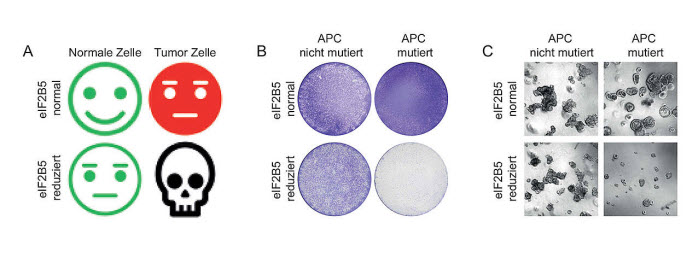In almost all cases of colon cancer, a specific gene is mutated – this offers opportunities to develop broadly effective therapeutic approaches. Research teams in Würzburg have taken this a step further.

If the eIF2B5 gene is inhibited, the colon cancer cells with an APC mutation do not do well: they die. On the left a schematic representation, in the middle cell cultures, on the right organoids. (Image: Armin Wiegering / Universität Würzburg).
In 90 percent of all cases of colon cancer, the tumour cells have one thing in common: the APC gene is mutated. Research groups at Julius-Maximilians-Universität (JMU) Würzburg in Bavaria, Germany, were looking for targets in these cells that could be used to destroy the cells.
"We wanted to find genes that are only important for the survival of cells with APC mutations, but not for healthy cells," explains Dr. Armin Wiegering, head of a junior research group at the JMU Biocentre and physician in surgery at Würzburg University Hospital.
The search for a needle in a haystack was successful. The research teams now report this in the journal Nature Cell Biology: If they inhibited the gene called eIF2B5, the mutated colon cancer cells died of programmed cell death – a self-destruction programme with which the organism normally disposes of damaged or aged cells. Healthy cells, on the other hand, were able to cope with the inhibition of the gene without any impairment.
Possible point of attack for treatment
"We have thus identified a very specific Achilles heel of APC-mutated tumours," says Professor Martin Eilers, cancer researcher at the Biocentre. We now know of a site where newly developed antitumour drugs might be able to have a very targeted effect.
The efficacy of an elF2B5 inhibition was shown in animal experiments. If the gene is not fully active in mice, they do not develop colon cancer so quickly and survive much longer if they do. The researchers also experimented with organoids. These are miniature tumours that are cultivated in the laboratory from the cancer tissue of patients. If the amount of elF2B5 was reduced, the organoids died.
Further genes will be investigated.
Next, the researchers want to investigate further genes in colon cancer cells – because elF2B5 is only one of five subunits of the larger eIF2B gene complex. "We also want to characterize the other subunits and see if we can also find a specificity here," Wiegering announces. We will then establish a method to degrade eIF2B5 in cancer cells. If this is successful, it might lead to a new option for therapies.













